► Full Peugeot 5008 MPV review
► We test seven-seat Pug on UK roads
► GT Line spec second of four trims
The previous-gen Peugeot 5008 may have been innovative, but in many ways it was too clever for its own good – and its interesting design and powertrain options failed to properly connected with the buying public. Enter the new Peugeot 5008, a paired-back, generic crossover-SUV thing , more akin to the Skoda Kodiaq and Kia Sorento than the Ford S-Max and Seat Alhambra. The changes bring it into line with the smaller Peugeot 3008, which pioneered the same transformation, but with just five seats.
The range kicks off with a 1.2-litre petrol unit – which we’re driving here in manual form for the first time – and takes in a 1.6-litre petrol, two versions of a 1.6-litre diesel and three versions of a 2.0-litre diesel. Transmissions range from a five-speed manual to an eight-speed auto, but most engines come with a choice of six-speed manual or automatic. All are front-wheel drive, obviously.
That leaves us with two Does the SUV-styled Peugeot 5008 – which we last drove on bumpy Portuguese roads – live up to the high demands of active family life in the Britain of 2018? And can a stingy little three-cylinder petrol engine with a conventional manual gearbox really be the best way to shift seven people between home, school, work, supermarket and gym?
Peugeot 5008: the interior
The interior design is not radical, but for the most part it works really well.
All seven seats are independently adjustable, and the front five are very comfortable. The seats in the third row are not accompanied by much leg room, but they’re fine for kids (or adults on short journeys), if a bit tricky to get into. They fold flat into the boot, but they leave a weird gap that lets you lose luggage under row two. Or you can remove them completely and get a boost to the already big and easily accessed boot space (and less weight), but experience suggests that once the seats are removed they’re never going back in again, because they’ll get buried under a pile of garden furniture in the garage and you won’t be able to find them when you want them.
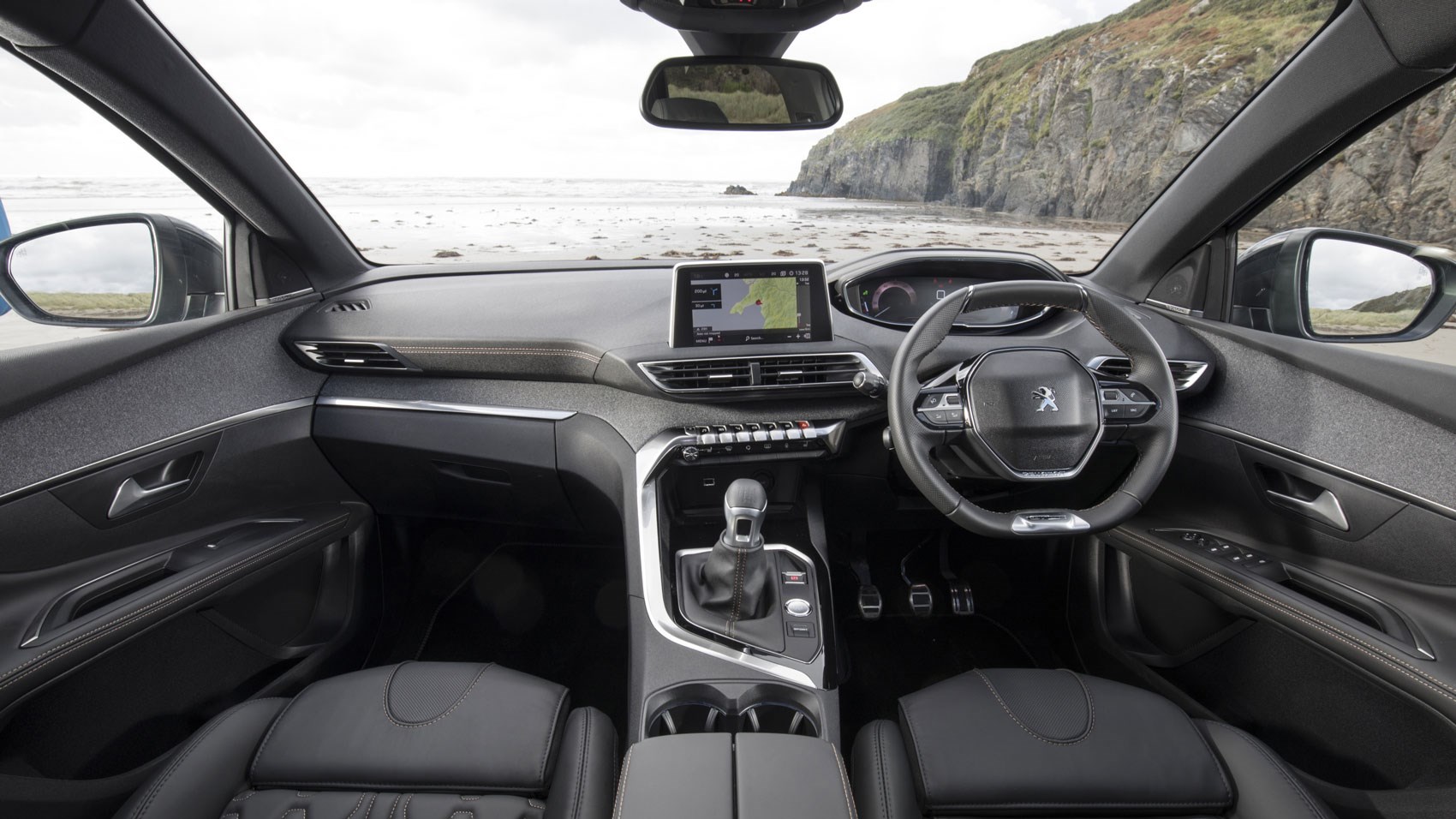
There’s a smattering of chargers, lights in sensible places, lots of stowage space and a general impression of this being a car that’s been developed by people with families. The materials used – not just the leather – are agreeable to the touch, and everything seems well put together.
The steering wheel – with its flat bottom and its flat top – is novelty for its own sake. In theory, it clears your legs better than a round wheel and lets you see the high-mounted instruments over the flattened top, but that’s all rather dependent on your own build and stature, and how you’ve adjusted the wheel and seat. And it just feels wrong when you’re actually steering, because every handful of rim feels different.
And – as with many PSA products – the balance between touchscreen and physical switches seems all wrong. Too many functions (such as temperature adjustment) are screen-only, and yet there are TWO rows of switches immediately beneath the screen, and a fair few others scattered around the cabin.
What if you’re the least important occupant – the driver?
You sit agreeably high up – not as tall as a Transit, but looking down on estate cars – in a roomy, conventionally laid out space.
The electronic parking brake is annoyingly slow to engage and disengage, which can make for awkwardness at junctions and in stop-start traffic. Adding to your woes, when you’re pulling away from a standstill, it’s easy to apply too little throttle and make poor progress.
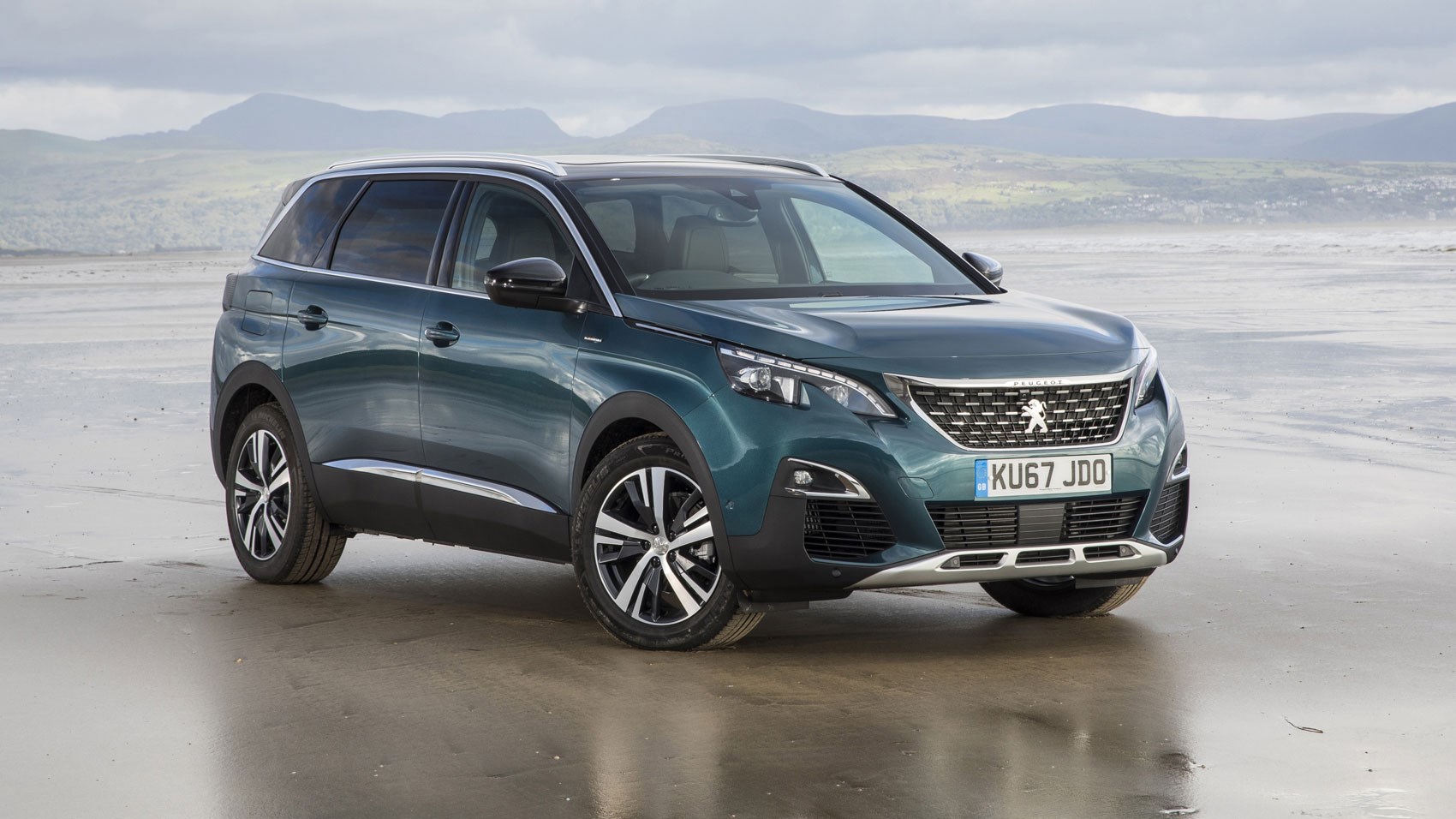
So then you floor the throttle, and those front wheels spin. It’s not very dignified, and it makes the 5008 feel longer and heavier than it actually is. And depending how tidily you’ve tucked away whichever of the seatbelts aren’t currently in use, there can be a lot of banging and rattling, which doesn’t help.
For all its SUV styling, it drives like an MPV; specifically, it drives like a Citroën C4 Picasso. There are times when the engine, transmission and chassis are a long way from being in perfect harmony.
Once you’re on the move and in the groove, though, it all starts to come together. The modest outputs of the highly efficient little engine cease to be an issue, and the precision of the six-speed manual gearbox makes it easy to keep it in the zone. The ride quality was impressive on all of the many UK roads we drove it on. This is a comfortable, roomy, refined and flexible car, prioritising passengers at least as much as the driver – all excellent qualities for an MPV, even if it’s one wearing SUV drag.
There are disappointments. The relatively shallow windows don’t give a great view out. And the steering often feels light at low speeds and heavy at higher speeds, while always being vague and artificial.
Go steady on the 5008 spec
The basic spec of the 5008 is pretty good. There are four trim levels – Active, Allure, GT Line and GT – and you don’t miss out on much (aside from the reversing camera) if you go no higher than the smart, versatile Active.
Questionable additions as you go up the spec ladder include a fiddly and slow sat-nav system, a very aggressive active lane-keeping system, the least soothing massage seats this side of the Spanish Inquisition, wood, bigger wheels and all manner of ambience configurability.
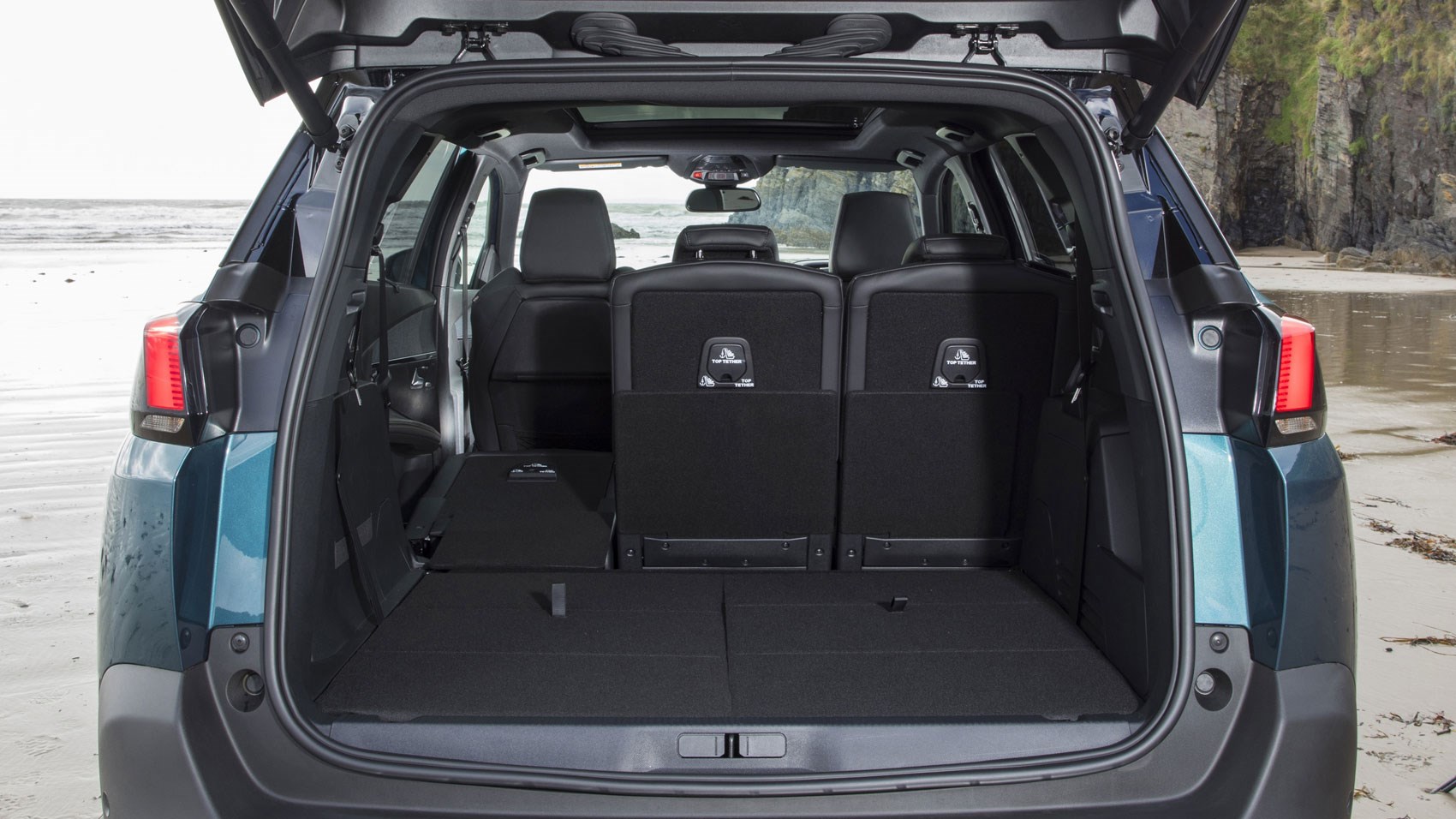
Various options, mostly cosmetic, are also available. Our test car came with more than £4000 worth, of which the £590 audio upgrade and £870 panoramic opening sunroof seemed to be unreservedly worth it; without that sunroof, the cabin could seem oppressively dark.
Verdict
The marketing chat may have shifted from MPV to SUV, but the heart of the 5008’s appeal remains the neat, adaptable, accommodating, seven-seat interior. Don’t get fooled into thinking that this is some sort of off-roader and just take it for what it is.
Whatever shape of body they have, seven-seaters are in heavy demand. It’s a pity that driving pleasure isn’t a bigger part of the 5008 package, but when its practical virtues are so prominent it’s hard to argue.
Is this the right engine/gearbox combo? The 1.2 doesn’t make a compelling case. The lightness of the triple has got to be a good thing, and the economy is decent for a petrol, but it really could do with some more power.
Check out Phil McNamara’s initial thoughts of the 5008 when we drove it in Europe…
Here’s a sign of the times: the Peugeot 5008 has been reincarnated as an SUV, having spent its previous life as an MPV collecting dust in showroom corners.
Rest in peace seven-seat people carrier, welcome seven-seat 4×4 (not that four-wheel drive will be available) with epic space for people and packages, and a range of competitive engines.
The 5008 is basically a 190mm-stretched version of the 3008, Peugeot’s distinctive and thoroughly decent five-seat SUV, but big brother will cost a couple of grand more model-for-model. Expect the entry price around £23,795, and UK deliveries beginning in September.
Big brother! Does that mean a leaden drive?
CAR drove the flagship model first, a 2.0-litre BlueHDI diesel with 180bhp, mated to the six-speed automatic transmission.
On Portuguese roads so potholed as to banish any longing for home, the taut 5008 HDI serves up a busy, uncomfortable ride, often triggering an unsettling aftershock of pitch. And the 3008’s most engaging dynamic attribute, its responsive, sweetly weighted steering, feels like it’s been filled with concrete. Sacre bleu!

The diesel engine remains smooth and adequately hushed, with sufficient acceleration: it’s the quickest 5008 – just – with 0-62mph in 9.1secs. The automatic transmission intuitively hangs onto second and third gear on coastal roads more up and down than Arsenal’s form, but throttle response could be snappier, particularly upon kickdown. There’s a sport button to remedy that, mind you.
For the record, combined fuel consumption is 58.8mpg, and this 5008 emits 124g/km of carbon dioxide.
Shame. Does a petrol engine redeem the 5008?
Oh yes, it feels like a different animal. The top spec diesel in plush GT trim (wonderfully quilted leather/polished steel/appealing pale wood) weighs a hefty 220 kilos more than the base 1.2-litre manual turbo, and the HDI has a distinct, firmer set of springs and dampers, to go with its 19in rims.
Jump into the 1.2 Puretech petrol using the same auto ‘box, and the difference is instantly apparent. Turn the wheel (the shape of a fifty pence piece and not much bigger), and the nose responds more eagerly, with a lighter touch and less springy resistance. The ride, on 18-inch rims, is also far more settled, fluidly absorbing the crevices and crests, and with superior body control. The 1.2 just feels so much more nimble, for which you can partly credit the commendably light, 1317kg kerbweight.
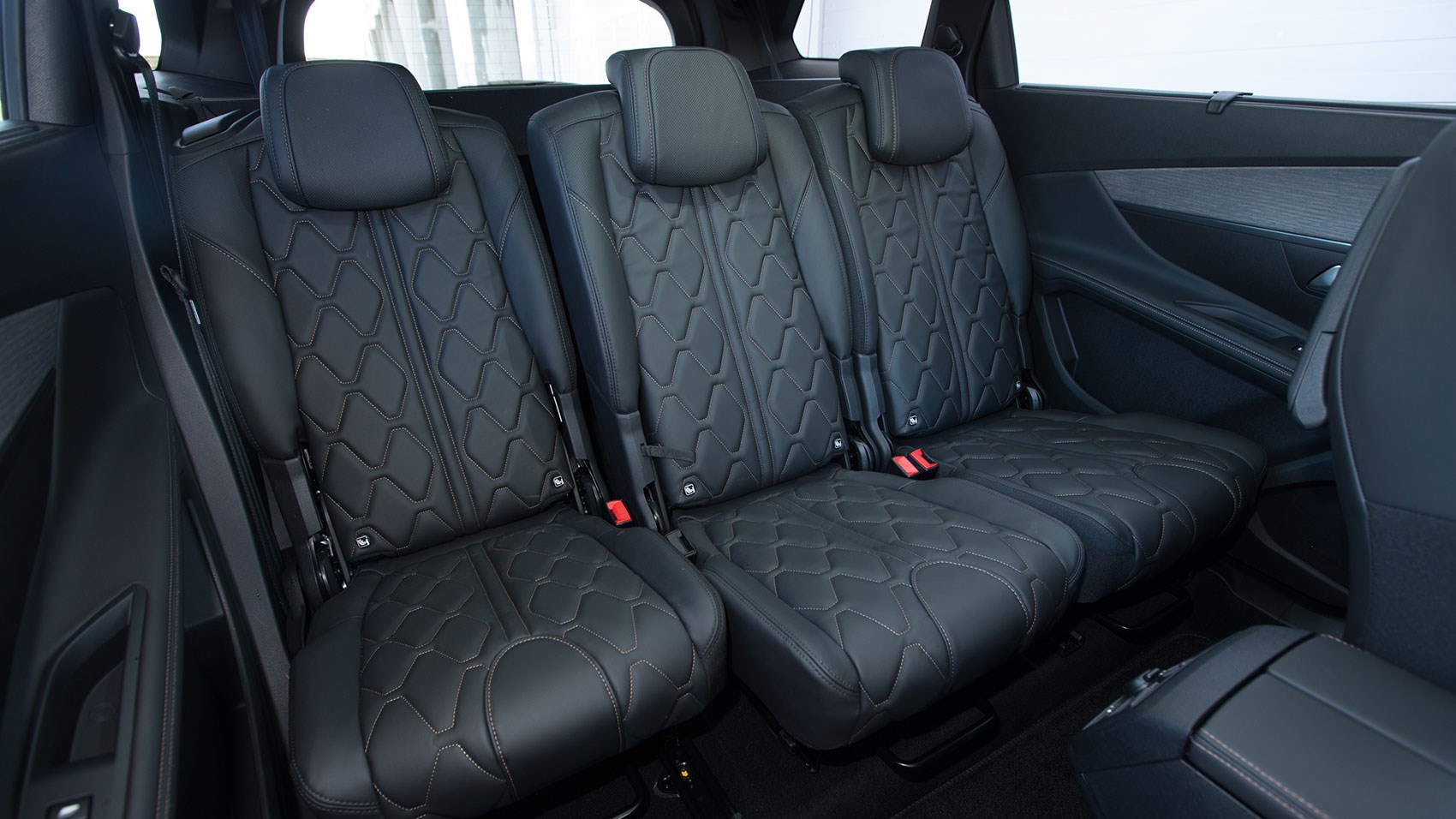
And that means the three-cylinder turbocharged engine can cope with the longer SUV’s demands, almost all of the time. Two up, the mid-range feels a bit wheezy on the hills (note to Snowdonia dwellers) but otherwise the engine retains the spritely, propulsive urge familiar from the Citroën C3, though its goading three-cylinder soundtrack is down in the mix. Throttle response is a bit woolly (resort to the sport button), while manual shifts from the hollow plastic paddles aren’t the snappiest.
Where the 5008 excels is in its refinement. Wind noise is extremely well suppressed, and tyre grumble is made as welcome as Romanian caterers at a Brexiteer’s birthday party. Impressive stuff.
What’s it like inside?
That sense of civility is enhanced by a cockpit that lavishes space on its occupants. The second row of seats, usefully of identical size so you can get three child seats abreast, has more legroom than a business class flight.
A pull of the handle at squab level, and the seat folds flat, making it easier to clamber into the rearmost seats. Get your mid-rowers to share their legroom, and there’s sufficient space for a six-footer to wedge his feet under the seat ahead and cope with a half-hour journey.
Peugeot reckons it’s got the packaging all wrapped up against the competition of Land Rover Discovery Sport, Skoda Kodiaq, Nissan X-Trail and Hyundai Santa Fe, boasting the most generous ratio of wheelbase and trunk considering its (compact-ish) 4641mm length.
Blessed with a low sill, the boot is certainly vast: 952 litres behind the second row of seats. Yank a little lever, and you can even remove seats six and seven, saving the day when unexpected BBQ guests arrive or freeing up two more pockets of 40 stowage litres. Stripped down in this way and with the middle three seats folded, you can cram in 2150 litres of junk.
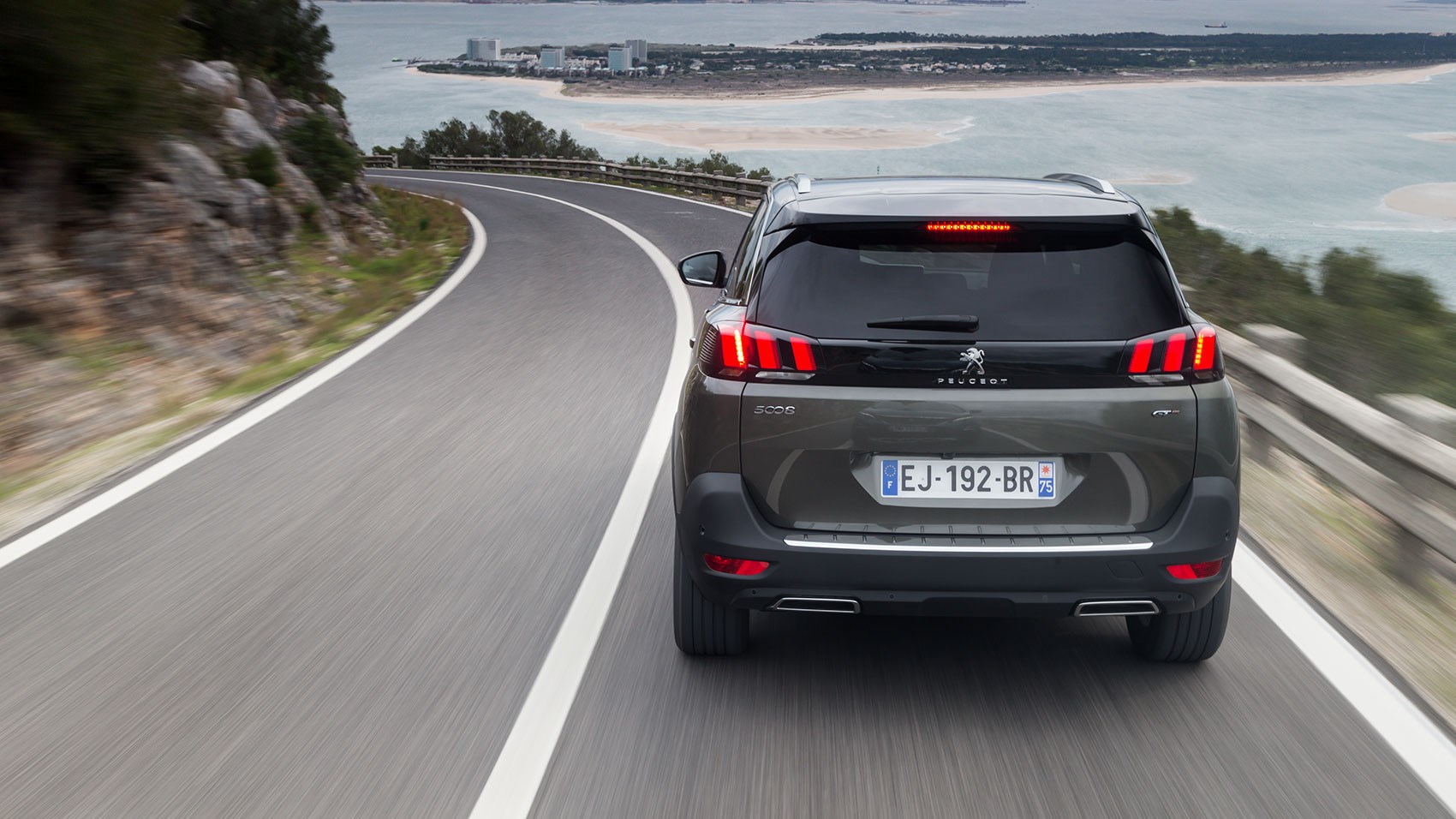
Up front, the dashboard architecture is identical to the 3008’s, with Peugeot’s sophisticated i-Cockpit control system standard in the UK. A 12.3-inch screen renders digital dials, which you can supplement or replace with your choice of information such as 3D navigation or safety feature displays. It’s complemented by an 8in central touchscreen, with pinch and zoom function, and eight metallic shortcut keys which make it a cinch to use – once you’ve mastered Peugeot’s quirky submenu filing system.
Standard equipment includes Mirrorlink to access smartphone functions on the move, plus speed sign recognition, automatic emergency braking and distance alert. Lane keeping assist and blindspot detection enter at the second trim level, Allure, while nifty automated cruise control which aggressively centres the car in its lane, and massage seats, are standard on top spec GT models. Advanced Grip Control, a two-wheel drive take on Land Rover’s Terrain Response to manage traction on different surfaces such as mud or sand, is optional.
Verdict
Having been a late developer in the SUV field – 26 million sold in the world last year, French execs note while trying not to rub their hands together with glee – Peugeot will have small, mid-size and seven-seat SUVs on sale by the autumn. The 5008 will be the smallest in volume, but it’s competing in a much less crowded market.
If you discount (good luck) the more expensive Land Rover Discovery Sport and the older Nissan X-Trail, it’s a fight to the death between the polished Skoda and the 5008. The pragmatic Skoda Kodiaq is the default choice if you need four-wheel drive, but the Peugeot has more flair, a marginally better package and the edge on refinement. And with an extended VW Tiguan coming this year, ‘compact’ seven-seat SUV buyers have never had it so good.
Read all of our Peugeot reviews here